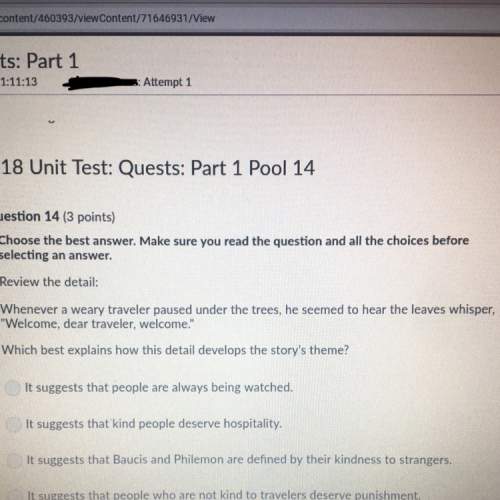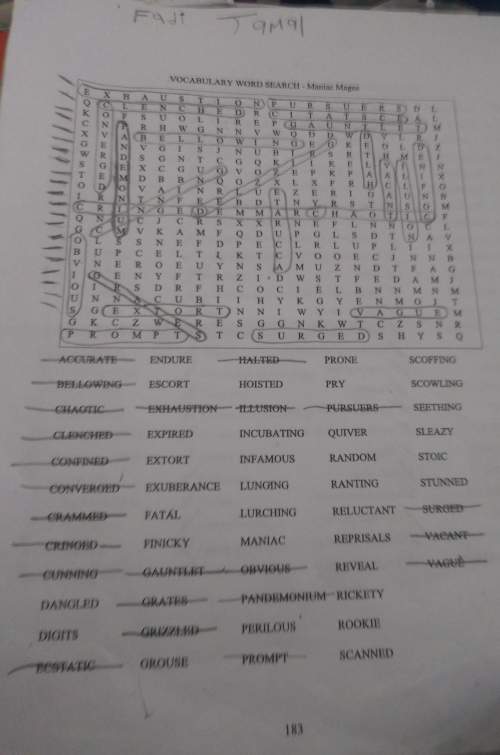Read the passage then answer the questions that follow.
Camping Without a Phone.
I could...

English, 01.06.2021 21:50, juliomeadaptas
Read the passage then answer the questions that follow.
Camping Without a Phone.
I couldn’t believe it when my parents told me we were spending our winter vacation going camping! They are always trying to get me to go outside more. It seems like my mom is constantly saying, “Brian, turn off the computer!” or “Brian, put down your phone and talk to us!” They don’t seem to understand that I’m in the zone when I’m using a keyboard, so of course I don’t want to stop.
We drove for an hour to Everglades National Park. As soon as we got there, my cell phone stopped working. The precaution I had taken of fully charging it had done no good. I couldn’t get a signal for it. Suddenly, I was facing three days of no contact with the outside world. My little brother, Ben, thought it was amusing, and my mom tried to convince me I’d like it. “You’ll be able to look around more when you’re not staring at a screen,” she said.
“You might have to act like a human being,” said Ben as he started laughing. Then he escaped to the other side of the campground.
We took a hike with a ranger in the afternoon. At first, I couldn’t care less, but after a while I started paying attention. By the end of the hike, I realized there was more action going on in the park than in most video games. It just didn’t happen as obviously.
First, the ranger explained that fires can be beneficial for the Everglades. Lightning starts the fires. The pines and some other trees resist fire, and their branches are too high for the fires to reach. Other trees and plants that try to take over from the pines are lower and get burned away. I could almost envision the fires burning around us while we walked, as if they were on a video screen.
Then we stopped to look at a pile of fur and little bones, apparently left behind by a bobcat. They were probably the remains of a rabbit. The ranger said that bobcats hunt nearly every night and sometimes eat animals as large as a deer. Unfortunately we didn’t get to see the action, but we saw some of the results.
Then we saw a wood stork wading and moving its beak back and forth. It was over three feet tall. Because the water is muddy and full of plants, it can’t see the small fish it’s trying to catch. But its beak is very sensitive. When it touches a fish, its beak snaps closed in 25 milliseconds! That’s faster than some computer networks respond when I touch a key.
That night I was exhausted from walking all day, and because I didn’t use enough sunscreen I looked a little like what the ranger called the “tourist tree.” The gumbo limbo tree has reddish bark that peels off, like it got sunburned. Even so, I woke up in the middle of the night, and I was terrified at first because of some mysterious sounds. But then I recognized the barred owl the ranger had described to us earlier that day. It sounds like it’s calling out “Who cooks for you? Who cooks for you?” That helped me to relax, so I was able to fall back to sleep.
We spent a lot of time exploring over the next two days. I started to understand the connection between the land and water and animals. In the Everglades, you couldn’t even get rid of the mosquitoes without creating a big change for other animals. Small fish eat mosquito eggs; other fish eat the smaller fish; large fish called gars eat those fish; and alligators eat the gars. If you eliminated the mosquitoes, you might lose some of the other animals higher up the food chain too.
After we left, we talked in the car about the Everglades and how different it was from where we lived. Suddenly, right in the middle of our discussion, I heard a familiar tone from my phone. My friend Jeff was sending me a text. Without thinking, I reached for my phone, but then I put it back down. “Aren’t you going to text back?” asked Ben.
“I will in a little while,” I said. Ben looked stunned. My dad and mom looked at each other and just smiled.
Which detail from the text best supports your answer in question 1?
A."They are always trying to get me to go outside more.
B."Then we saw a wood stork wading and moving its beak back and forth."
C."After we left, we talked in the car about the Everglades and how different it was from where we lived."
D."Suddenly, right in the middle of our discussion, I heard a familiar tone from my phone."

Answers: 1
Other questions on the subject: English

English, 22.06.2019 06:30, ciarrap552
Read the excerpts from "the royal house of thebes" and "the story of a warrior queen." "we are women," she told her sister. "we must obey. we have no strength to defy the state." "choose your own part," antigone said. "i go to bury the brother i love." "you are not strong enough," ismene cried. "why, then when my strength fails," antigone answered, "i will give up." she left her sister; ismene dared not follow her. —"the royal house of thebes" again and again the romans were defeated, till it almost seemed as if the britons really would succeed in driving them out of the country. boadicea herself led the soldiers, encouraging them with her brave words. "it is better to die with honor than to live in slavery," she said. "i am a woman, but i would rather die than yield. will you follow me, men? " and of course the men followed her gladly. —"the story of a warrior queen" how are the archetypes presented in these two passages different? the first passage shows antigone as a warrior, and the second passage shows boadicea as a tragic heroine. the first passage shows antigone as a tragic heroine, and the second passage shows boadicea as a sage. the first passage shows antigone as a rebel, and the second passage shows boadicea as a warrior. the first passage shows antigone as a villain, and the second passage shows boadicea as a sage.
Answers: 1

English, 22.06.2019 07:20, savthespice
Read the excerpts from “take the tortillas out of your poetry” and “speaking arabic.” my friend had concluded that if he took his language and culture out of his poetry, he stood a better chance of receiving a fellowship. he took out his native language, the poetic patois of our reality, the rich mixture of spanish, english, pachuco and street talk which we know so well. in other words, he took the tortillas out of his poetry, which is to say he took the soul out of his poetry. at a neighborhood fair in texas, somewhere between the german oom-pah sausage stand and the mexican gorditas booth, i overheard a young man say to his friend, “i wish i had a heritage. sometimes i feel—so lonely for one.” and the tall american trees were dangling their thick branches right down over his head. which best states how the structures of both excerpts support ideas about cultural diversity? each incorporates non-english words. each incorporates academic words. each incorporates offensive words. each incorporates nonsense words.
Answers: 3

English, 22.06.2019 09:00, ravenmcfarlandp07okx
Which of the following statements is most accurate? a. effective communication skills are not as important as technical skills. b. good communication skills can you in the classroom, on the job, and in your personal life. c. communicating effectively is not related to job success. d. learning to communicate effectively cannot be taught because communication skills are inborn.
Answers: 1

English, 22.06.2019 09:30, gototiger
What is most likely the speaker’s reason to open with this? in approaching this problem, we cannot turn the clock back to 1868, when the [fourteenth] amendment was adopted, or even to 1896, when plessy v. ferguson was written. we must consider public education in the light of its full development and its present place in american life throughout the nation. only in this way can it be determined if segregation in public schools deprives these plaintiffs of the equal protection of the laws.
Answers: 1
Do you know the correct answer?
Questions in other subjects:





Mathematics, 02.08.2019 03:00




Mathematics, 02.08.2019 03:00








